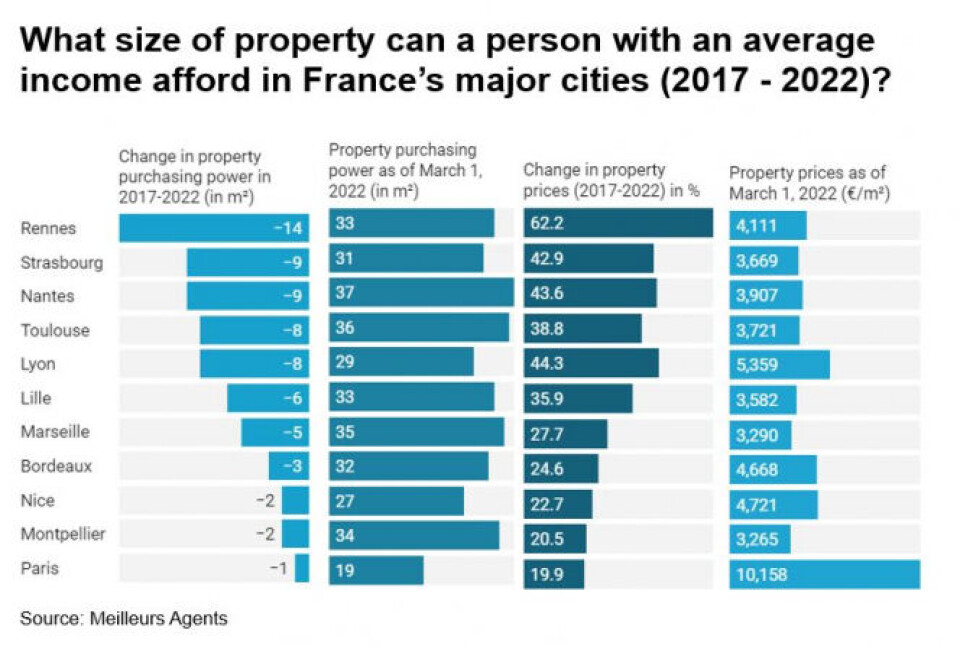-
New agreement to help with home renovations launches in Dordogne
The plan aims to connect citizens with local public renovation services to modernise old housing stock
-
Hosting scheme in south-west France lets newcomers sample lifestyle
Households in nine Dordogne communes volunteer under Mes Nouveaux Voisins scheme
-
How long does it take to sell property in different areas of France? New study
Many major cities are showing signs of recovery when it comes to supply, demand, prices, and time to sell
House prices, sublet scam: Five updates for property owners in France
A buyer can now afford properties six square metres smaller on average, a man is fined over €200,000 for illegal subletting, a court settles a four-metre high wall dispute and more

1. Property buyers lose six square metres in five years
A person with a moderate salary in France can afford on average to buy a property six square metres smaller in major cities today than in 2017, according to Meilleurs Agents, a website that lets users see property price estimates.
The study looked at the property purchasing power of a single adult with an average income in France’s 11 major cities.
It found that in 2017, they were able to afford 44 square metres in Toulouse, 47 in Rennes, 40 in Marseille and 46 in Nantes.
In March this year, they could afford on average no more than 37 square metres in these cities.
In Rennes (Brittany), the loss in property purchasing power is the most extreme, with the hypothetical buyers able to afford 14 square metres less today than in 2017.
This is followed by Nantes (Pays de la Loire), where buyers have lost nine square metres and Strasbourg (Grand Est), where they have lost eight square metres.
The reason for this loss in property purchasing power is down to both the price of property outside of Paris rising and wages not increasing to keep pace.
Outside of Ile-de-France, property prices in France’s major cities increased by 35.1% in the five-year period. In Rennes, property prices increased by an average of 62.3%, while wages only increased by 9.3%, said Barbara Castillo Rico, head of economic studies at Meilleurs Agents.
Paris saw the smallest change of all the major cities, with the hypothetical buyer able to afford only one square metre less today than in 2017.
Ms Castillo Rico said this was due to incomes increasing more in the capital than in other cities.

2. Illegally subletter fined over €220,000, a new record
A man who illegally sublet the 30-square-metre studio he rented in Paris’ upmarket sixth arrondissement has been fined a record €221,000.
This is around five times more than the previous record for illegal subletting in France.
The man claimed that the owners were aware of him subletting the flat and had implicitly agreed to it, but a clause in the rental agreement stipulated that there must be a written agreement for this which could not be produced, the Paris Court of Justice stated.
In total, he sublet the flat on Airbnb to 329 different clients over 1,114 days, earning more than €198,000.
In each year between 2017 and 2020, he sublet the property for more than 120 days in total, which is illegal in cities of over 200,000 inhabitants in France (except in some cases).
Read more:Why woman could break 120-day Airbnb legal rental limit for Paris home
It means that Airbnb should have intervened and stopped the property from being rented out. It is not clear yet if the accommodation booking platform will also face legal consequences.
On top of the full €198,000 that man has to pay back, he was also behind on his own rent payments, and must pay the landlords €11,370 in back-rent.
The court, in a judgement handed down on March 22, also ordered the man to pay €11,500 to make repairs on the property after noting damage to the flooring, in the bathroom and kitchen, and to the furniture.
Finally, he also has to pay €1,000 in legal fees, bringing the total to around €221,000.
The man, reported to be in his 50s or 60s, rented the flat between December 2016 and December 2020.
It was not until June 2020 that the owners discovered he was illegally subletting the property, when a bailiff visited the flat and found a person there who said they had rented it on Airbnb.
3. End of France’s winter eviction truce
France’s annual winter eviction truce, called la trêve hivernale, ends after today (March 31).
The truce begins every winter and usually lasts around five months, between November and the end of March.
In 2020 and 2021 it was extended due to the coronavirus pandemic, ending in July and then May respectively.
It is illegal for a landlord to evict a tenant during this period, including for reasons such as not paying rent.
The landlord can go to court if the rent is not paid, but the tenant will only be evicted at the end of the five months of winter. The eviction must then be carried out by a bailiff or the police, and not by the landlord.
This period also guarantees the tenant access to electricity, gas or water, even in case of unpaid bills. However, the rent and bills will still be owed by the tenant at the end of the period.
The truce does not prevent all evictions. For example, a person can still be evicted if ordered by a judge due to reasons linked to domestic violence or divorce.
It is expected that this year, around 30,000 to 40,000 people face being evicted once the truce ends, Marie Rothhahn, head of the eviction prevention hotline Allo Prévention Expulsion told Le Figaro.
In 2021, around 12,000 people were evicted after the truce, while only around 8,000 were made to leave their homes in 2020. These numbers were much lower than the average 16,000 each year because of protections offered due to the pandemic, such as the extensions to the truce.
This year’s bumper figure will include people who were not evicted during the pandemic, as well as the normal number of evictees.
The majority of evictions are due to unpaid rent, with that reason accounting for around 68% of cases.
Other reasons include squatters (11% of cases), people who had refused to leave after the landlord decided to sell the property (9%), tenants causing trouble for neighbours (8%) and other reasons, such as demolition of the building, make up 4%.
Around 32% of people who are evicted do not find new accommodation for themselves for around three years, a report from housing assistance association Fondation Abbé Pierre shows. They tend to move to temporary housing, such as to hostels or mobile homes, or stay with friends or family.
4. Court orders demolition of four-metre high wall that ‘blocks sunlight reaching neighbours’ pool’
A couple in the Lyon area have been ordered to demolish an outside wall, measuring four metres high and 17 metres long, as it interferes with their neighbour’s view despite them having received planning permission to build it.
The top appeal court, the Cour de cassation, which has jurisdiction over all civil and criminal matters, said that the huge wall blocked the neighbours’ view from their living room bay windows of the surrounding hills.
It also stopped sunlight reaching their swimming pool.
Due to this, the court ordered the wall be demolished, despite the fact that the couple had planning permission for it.
In our property roundup on March 17, we reported a similar story where a neighbour complained of a high wall, but in that instance, the court sided with the builder of the wall.
That was because the wall did not block any sunlight reaching their neighbours’ garden, restrict their neighbours’ view or violate any aesthetic regulations.
You can read about that case in our article here: Boilers, walls, widows: Five updates for property owners in France
5. Permission can be needed to install boilers with flue pipes
If you are planning on installing a boiler that requires a flue to release exhaust gases outdoors in a shared flat building (copropriété), you must first have approval from the building’s managing agent (syndic).
France’s top appeal court, the Cour de cassation, which has jurisdiction over all civil and criminal matters, ruled in a March 9 decision that as a boiler flue installation involves the external and therefore communal wall of an apartment block, approval must be granted in advance.
The case came around after the owner of a flat installed a boiler with a flue as it was deemed part of necessary renovation work. However, the building’s managing agent (syndic) complained, and the complaint was upheld by the Cour de cassation, which ordered the building be ‘returned to its original state’.
A boiler flue acts in place of a chimney to remove gases generated by boilers. It is generally eight to 12cm in diameter, is short, and sticks out the side of a building (as pictured at the beginning of the article).
Related stories
Steep rises for many French taxe foncière bills amid high inflation
MAPS: How rent prices vary between France’s major cities
French inheritance: What widow/widower must do to stay in shared home
























